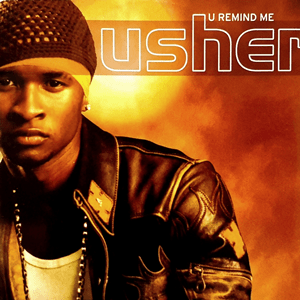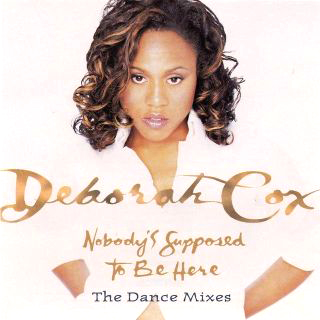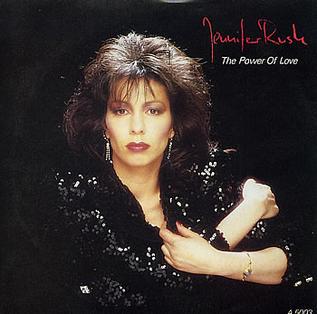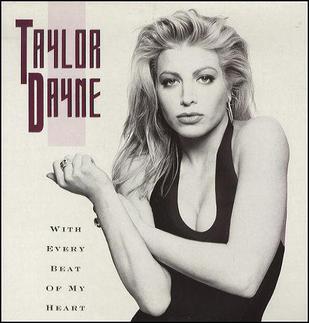
Taylor Dayne is an American singer who rose to fame after her first two albums were both certified 2× Platinum by the Recording Industry Association of America (RIAA). Dayne achieved seven US Top 10 singles, including "Tell It to My Heart", "Prove Your Love", "I'll Always Love You", "Don't Rush Me", "With Every Beat of My Heart", "Love Will Lead You Back", and "I'll Be Your Shelter". Dayne also scored the US Top 20 hits "Heart of Stone" and "Can't Get Enough of Your Love". In the United States, she achieved three gold singles and has sold over 75 million albums and singles worldwide. Dayne has received over three Grammy Award nominations, an American Music Award and multiple New York Music Awards. She has also been ranked by both Rolling Stone and Billboard on their lists of the most successful dance artists of all time.

"Where Do Broken Hearts Go" is a song recorded by American singer Whitney Houston for her second studio album, Whitney (1987). It was released as the fourth single from the album on February 15, 1988 to contemporary hit radio in the United States. The song was written by Frank Wildhorn and Chuck Jackson and produced by Narada Michael Walden. A pop ballad set in the key of D major, the record is about someone seeking for a former lover to return after a breakup. Upon its release, the song received mixed reviews from critics.

"Wifey" is a song by American R&B trio Next. The song was written by Eddie Berkeley, Keir Gist, band member Robert "RL" Huggar, and singer Lil' Mo for the group's second studio album, Welcome II Nextasy (2000). The song was released as the album's lead single on May 8, 2000. "Wifey" peaked at number one on the US Billboard Hot R&B/Hip-Hop Singles & Tracks chart while reaching number seven on the Billboard Hot 100. It also entered the top 20 in New Zealand and the United Kingdom. In 2001, the song won an AWARD Rhythm & Soul Award for in the Award-Winning R&B/Hip-Hop Songs category.

"U Remind Me" is a song by American singer Usher. It was written by Edmund "Eddie Hustle" Clement and Anita McCloud and produced by Clement along with duo Jimmy Jam & Terry Lewis for Usher's third studio album 8701 (2001). A mid-tempo R&B track, the song is about a man who meets a woman who seems like a nice catch, but he decides not to enter a relationship with her because she looks too much like an ex-girlfriend with whom he had a bad breakup.

"U Know What's Up" is a song by American R&B singer Donell Jones. It was written by Edward "Eddie F." Ferrell, Darren Lighty, Clifton Lighty, Balewa Muhammad, Anthony Hamilton, and Veronica McKenzie for his second studio album, Where I Wanna Be (1999), while production was helmed by Ferrell and Darren Lighty for Untouchables Entertainment.

"Most Girls" is a song by American singer Pink, released as the second single from her debut album, Can't Take Me Home (2000). It was released on June 6, 2000, and, after spending 16 weeks on the US Billboard Hot 100 chart, peaked at number four on November 25. The song also reached number one in Australia, where it was certified platinum, number two in Canada and New Zealand, and number five in the United Kingdom.

"Thank You" is a song written and performed by English singer-songwriter Dido. The song made its first appearance in 1998 on the soundtrack of the movie Sliding Doors. It was later included on Dido's 1999 debut album, No Angel, and was released as a single on 18 September 2000. The same year, American rapper Eminem sampled the track for his hit single "Stan", which helped propel "Thank You" and No Angel to mainstream success.

"Don't Let Me Get Me" is a song by American singer Pink. It was written by Pink and Dallas Austin and produced by the latter for her second studio album, Missundaztood (2001).

"Love Will Lead You Back" is a song recorded by American singer Taylor Dayne for her second studio album, Can't Fight Fate (1989). Written by Diane Warren and produced by Ric Wake, the song was released on January 12, 1990, by Arista Records as the second single from the album.

"Nobody's Supposed to Be Here" is a song by Canadian recording artist Deborah Cox, released as the lead single from her second studio album, One Wish (1998). Written by Montell Jordan and its producer, Anthony "Shep" Crawford, the song was released on the same day as the album, on September 15, 1998, by Arista Records. It is Cox's most successful song, peaking at number two on the Billboard Hot 100 for eight weeks and spending a then-record 14 weeks at number one on the Hot R&B Singles & Tracks chart. In 2017, Billboard ranked the song at number five on its "Greatest of All Time Hot R&B/Hip-Hop Songs" chart.

"The Power of Love" is a pop song co-written and originally recorded by American singer-songwriter Jennifer Rush in 1984. It was released in December 1984 by CBS Records as the fifth single from her debut album, Jennifer Rush (1984), and has since been covered by Air Supply, Laura Branigan, and Celine Dion.

"Here with Me" is the debut single of English singer-songwriter Dido. It was the first single she released from her 1999 debut studio album, No Angel. The song was written about her then-boyfriend Bob Page. The single was released on 17 May 1999 in the United States but was not released in the United Kingdom until February 2001, serving as Dido's debut single in her home country. In other territories, it was issued as the album's second single, following "Thank You". Shortly after its release, "Here with Me" was used as the theme song for the American science fiction television programme Roswell (1999–2002).

"Swear It Again" is a song by Irish boy band Westlife. The ballad was released on 19 April 1999 in the United Kingdom as the first single from their self-titled debut album (1999). The song peaked at number one on the UK Singles Chart for two weeks, giving Westlife their first of 14 UK number-one singles. "Swear It Again" is Westlife's only single to have charted in the US, peaking at number 20 on the Billboard Hot 100 and ranking number 75 on the Billboard Hot 100 year-end chart in 2000.

"I'll Always Love You" is a song by American singer Taylor Dayne and the third single from her debut studio album, Tell It to My Heart (1988). The song was written by Jimmy George and produced by Ric Wake. It was also released as the album's third single in July 1988 by Arista Records. Dayne was nominated for a Grammy Award for Best Female R&B Vocal for her performance on "I'll Always Love You" in 1989. The song was also nominated for Best R&B Song that year. "I'll Always Love You" was certified gold by the Recording Industry Association of America (RIAA).

"Adia" is a song by Canadian singer Sarah McLachlan from her fourth studio album, Surfacing (1997). It was co-written by McLachlan and her longtime producer, Pierre Marchand. McLachlan has said about the song, "...more than anything, it's about my problems in dealing with feeling responsible for everyone else". "Adia" was released as the third North American single from Surfacing on 2 March 1998; in Europe, it served as McLachlan's debut single, receiving a UK release in September 1998.

"With Every Beat of My Heart" is a song recorded by American singer Taylor Dayne for her second studio album, Can't Fight Fate (1989), which reached the Top 5 position on the Billboard Hot 100. Released on October 10, 1989, the song written by Lotti Golden, Tommy Faragher and Arthur Baker, and produced by Ric Wake, was the lead single, kicking off Dayne’s Arista Records debut LP, Can't Fight Fate.

"Heart of Stone" is a song by American singer Taylor Dayne for her second studio album, Can't Fight Fate (1989). Produced by Ric Wake, the song was released in July 1990 by Arista Records as the fourth and final single from Can't Fight Fate. The song is co-written by Elliot Wolff, responsible for Paula Abdul's number-one singles "Straight Up" and "Cold Hearted".

"Prove Your Love" is a song recorded by American singer Taylor Dayne for her debut studio album, Tell It to My Heart (1988). Written by Seth Swirsky and Arnie Roman, and produced by Ric Wake, the song was released in 1988 as the album's second single, by Arista Records. The single was Dayne's second top 10 hit on the US Billboard Hot 100 chart, where it peaked at number seven. The single spent eleven weeks in the Top 40. It also appeared on the Dance Club Songs chart, where it became Dayne's first number-one hit on that chart on April 23, 1988. Furthermore, the single was a hit overseas, going to number-one in Switzerland, number four in West Germany, and number eight on the UK Singles chart.

Tell It to My Heart is the debut studio album by American singer-songwriter Taylor Dayne, released on January 19, 1988, by Arista Records. Four singles were released and all of them reached the top 10 of the US Billboard Hot 100: "Tell It to My Heart", "Prove Your Love", "I'll Always Love You", and "Don't Rush Me", with the first two reaching the top 10 of the UK Singles Chart at numbers 3 and 8, respectively. The album has been certified double platinum by the Recording Industry Association of America (RIAA), denoting shipments in excess of two million copies in the United States.

"You Don't Treat Me No Good" is a song by American soul group Sonia Dada. Released in 1992 as the group's debut single outside the United States, the song reached number two in New Zealand and became an unexpected number-one hit in Australia, spending four weeks atop the ARIA Singles Chart and ending 1993 as the nation's third-best-selling hit. Eighteen years later, country music singer Jerrod Niemann released a cover version under the title "Lover, Lover", and his version reached number one on the US Hot Country Songs chart.




















